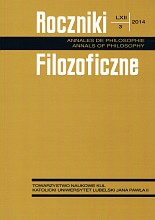Robert Louis Stevenson Philosophically: Dualism and Existentialism within the Gothic Convention
Robert Louis Stevenson Philosophically: Dualism and Existentialism within the Gothic Convention
Author(s): Urszula Czyżewska, Grzegorz GłąbSubject(s): Philosophy
Published by: Towarzystwo Naukowe KUL & Katolicki Uniwersytet Lubelski Jana Pawła II
Keywords: Stevenson; philosophy of dualism; duality; Gothic convention
Summary/Abstract: Robert Louis Stevenson’s The Strange Case of Dr Jekyll and Mr Hyde (1886) has often been regarded as a direct text in its dealings with a multi-dimensional conception of dualism, insecurity, anxiety and weakness. In the constrained moral atmosphere of Victorian England, where such issues were consciously or even intentionally avoided, the novel seemed to be articulating difficult themes about which society preferred to remain silent. A specific literary tradition, the history of Great Britain, scientific discoveries and lively, scientific debates of the 19th-century are ones of the most significant factors which make The Strange Case so original and memorable. The study poses a number of questions: Why does the history of the double return? What is a meaning of a double in a given context? What is so significant about this concept that it has inspired many others successors (e.g. Stephen King’s The Dark Half, 1989)? Why this motif is so popular? The project of delivering the answers to these questions in a one paper is not straightforward. Therefore, the main purpose of this article is limited to presentation and analysis of a condition of men in the face of emerging Modernism with a close reference to philosophical ideas of the turn of the century. On such basis, it investigates the foundations of Stevensonian philosophy of dualism.
Journal: Roczniki Filozoficzne
- Issue Year: 62/2014
- Issue No: 3
- Page Range: 19-33
- Page Count: 15
- Language: English

